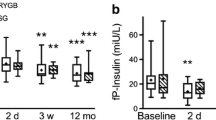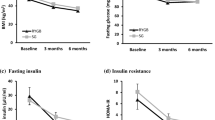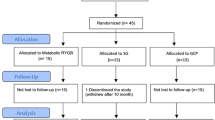Abstract
Background
Bariatric surgery (BS) is known to favorably impact fasting lipid profile. Fasting and postprandial lipids were evaluated before and 2 years after BS in obese type 2 diabetic (T2DM) patients.
Methods
A prospective study was conducted in 19 obese T2DM patients: ten undergoing sleeve gastrectomy (SG) and nine undergoing Roux-en-Y gastric bypass (RYGB). Before and 2 years after BS, clinical parameters and the response of lipid and incretin hormones to a mixed meal (MM) were assessed.
Results
The two groups had similar characteristics at baseline. After BS, weight loss was similar in the two groups (p ≤ 0.01). Fasting glucose, insulin, and triglycerides decreased while HDL cholesterol increased in a similar way (p < 0.05); in contrast, fasting LDL cholesterol decreased only after RYGB (p < 0.05). Post-meal glucose concentrations decreased while early insulin response significantly improved after both procedures (p < 0.001 for both). Postprandial triglycerides decreased after both procedures (p < 0.05) while postprandial LDL cholesterol decreased only after RYGB (p < 0.05). Meal-GLP-1 increased postoperatively in both groups although to a greater extent after RYGB (p < 0.001 vs. SG). GIP decreased after both procedures, especially after RYGB (p = 0.003). At multivariate analysis, GLP-1 peak was the best predictor of LDL reduction (β = −0.552, p = 0.039) while the improvement of HOMA-IR (β = 0.574, p = 0.014) and weight loss (β = 0.418, p = 0.036) predicted triglycerides reduction.
Conclusions
Both surgical procedures markedly reduce fasting and postprandial triglycerides and increase HDL cholesterol levels. LDL cholesterol decreases only after RYGB through a mechanism likely mediated by the restoration of GLP-1.



Similar content being viewed by others
Abbreviations
- T2DM:
-
Type 2 diabetes
- BS:
-
Bariatric surgery
- GLP-1:
-
Glucagon-like peptide-1
- SG:
-
Sleeve gastrectomy
- RYGB:
-
Roux-en-Y gastric bypass
- HDL:
-
High-density lipoprotein
- LDL:
-
Low-density lipoprotein
- IAUC:
-
Incremental area under curve
- BMI:
-
Body mass index
- HOMA-IR:
-
Homeostasis model assessment-estimated insulin resistance
- GIP:
-
Glucose dependent insulinotropic peptide
References
Yu J, Zhou X, Li L, et al. The long-term effects of bariatric surgery for type 2 diabetes: systematic review and meta-analysis of randomized and non-randomized evidence. Obes Surg. 2015;25(1):143–58.
Moustarah F, Gilbert A, Després JP, et al. Impact of gastrointestinal surgery on cardiometabolic risk. Curr Atheroscler Rep. 2012;4(6):588–96.
Buchwald H, Avidor Y, Braunwald E, et al. Bariatric surgery: a systematic review and meta-analysis. JAMA. 2004;13(14):1724–37.
Benetti A, Del Puppo M, Crosignani A, et al. Cholesterol metabolism after bariatric surgery in grade 3 obesity: differences between malabsorptive and restrictive procedures. Diabetes Care. 2013;36(6):1443–7.
Pihlajamäki J, Grönlund S, Simonen M, et al. Cholesterol absorption decreases after Roux-en-Y gastric bypass but not after gastric banding. Metabolism. 2010;59(6):866–72.
Pirillo A, Norata GD, Catapano AL. Postprandial lipemia as a cardiometabolic risk factor. Curr Med Res Opin. 2014;30(8):1489–503.
Griffo E, Nosso G, Lupoli R, et al. Early improvement of postprandial lipemia after bariatric surgery in obese type 2 diabetic patients. Obes Surg. 2014;24(5):765–70.
Waldmann E, Hüttl TP, Göke B, et al. Effect of sleeve gastrectomy on postprandial lipoprotein metabolism in morbidly obese patients. Lipids Health Dis. 2013;12:82.
Umeda LM, Pereira AZ, Carneiro G, et al. Postprandial adiponectin levels are associated with improvements in postprandial triglycerides after Roux-en-Y gastric bypass in type 2 diabetic patients. Metab Syndr Relat Disord. 2013;11(5):343.
Patel VJ, Joharapurkar AA, Shah GB, et al. Effect of GLP-1 based therapies on diabetic dyslipidemia. Curr Diabetes Rev. 2014;10(4):238–50.
Mells JE, Anania FA. The role of gastrointestinal hormones in hepatic lipid metabolism. Semin Liver Dis. 2013;33(4):343–57.
Ben-Shlomo S, Zvibel I, Shnell M, et al. Glucagon-like peptide-1 reduces hepatic lipogenesis via activation of AMP-activated protein kinase. J Hepatol. 2011;54(6):1214–23.
Svegliati-Baroni G, Saccomanno S, Rychlicki C, et al. Glucagon-like peptide-1 receptor activation stimulates hepatic lipid oxidation and restores hepatic signalling alteration induced by a high-fat diet in nonalcoholic steatohepatitis. Liver Int. 2011;31(9):1285–97.
Nakatani H, Kasama K, Oshiro T, et al. Serum bile acid along with plasma incretins and serum high-molecular weight adiponectin levels are increased after bariatric surgery. Metabolism. 2009;58(10):1400–7.
Kohli R, Bradley D, Setchell KD, et al. Weight loss induced by Roux-en-Y gastric bypass but not laparoscopic adjustable gastric banding increases circulating bile acids. J Clin Endocrinol Metab. 2013;98(4):E708–12.
Patti ME, Houten SM, Bianco AC, et al. Serum bile acids are higher in humans with prior gastric bypass: potential contribution to improved glucose and lipid metabolism. Obesity (Silver Spring). 2009;17(9):1671–7.
Moschetta A. Nuclear receptors and cholesterol metabolism in the intestine. Atheroscler Suppl. 2015;17:9–11.
Padilla N, Maraninchi M, Béliard S, et al. Effects of bariatric surgery on hepatic and intestinal lipoprotein particle metabolism in obese, nondiabetic humans. Arterioscler Thromb Vasc Biol. 2014;34(10):2330–7.
Rao RS, Kini S. GIP and bariatric surgery. Obes Surg. 2011;21(2):244–52.
Miyawaki K, Yamada Y, Ban N, et al. Inhibition of gastric inhibitory polypeptide signaling prevents obesity. Nat Med. 2002;8(7):738–42.
Miyawaki K, Yamada Y, Yano H, et al. Glucose intolerance caused by a defect in the enteroinsular axis: a study in gastric inhibitory polypeptide receptor knockout mice. Proc Natl Acad Sci U S A. 1999;96(26):14843–7.
Brethauer SA, Aminian A, Romero-Talamás H, et al. Can diabetes be surgically cured?: Long-term metabolic effects of bariatric surgery in obese patients with type 2 diabetes mellitus. Ann Surg. 2013;258(4):628–37.
Acknowledgments
The authors thank Giuliana Vitolo for the dietary counseling.
Author information
Authors and Affiliations
Corresponding author
Ethics declarations
All procedures performed in studies involving human participants were in accordance with the ethical standards of the institutional and/or national research committee and with the 1964 Helsinki declaration and its later amendments or comparable ethical standards.
Conflict of Interest
The authors declare that they have no competing interests.
Informed Consent
Informed consent was obtained from all individual participants included in the study.
Rights and permissions
About this article
Cite this article
Griffo, E., Cotugno, M., Nosso, G. et al. Effects of Sleeve Gastrectomy and Gastric Bypass on Postprandial Lipid Profile in Obese Type 2 Diabetic Patients: a 2-Year Follow-up. OBES SURG 26, 1247–1253 (2016). https://doi.org/10.1007/s11695-015-1891-4
Published:
Issue Date:
DOI: https://doi.org/10.1007/s11695-015-1891-4




